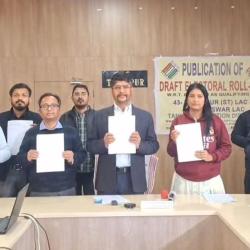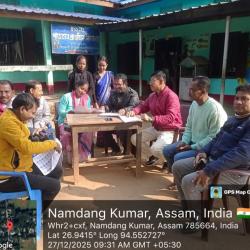On an unusually rainy afternoon of an unusually long monsoon in Delhi’s beautiful Jawaharlal Nehru campus, a very unusual concert unfolded. What the state government of Manipur did not do and the central government in Delhi would not do was done by a young man, Ronid Chingambam, with a guitar in his hand and poetry on his lips.
Since May 1, 2010 and the terrible standoff between the Nagas in the hills and the Meiteis in the valley of Imphal which led to terrible hardships for the Meiteis and deaths and violence for the Nagas in the state of Manipur, the only attempt to bring the communities together was by a group of young Meitei revolutionary poets called Burning Voices, led by Ronid Chingambam.
That he is Meitei is important. Many feel that the step towards reconciliation and peace must come from the more politically powerful Meiteis who dominate the state in terms of political representation, economic power and territorial anxiety, It is perhaps too much to ask of politicians, for whom these things are way too important, to reach out, beyond self-interest, and hold the hand of the Other, understand what it means to enter the subjectivity of the disenfranchised. To be sure, that is not impossible to do in the case of Manipur because the Meiteis suffer a similar othering from the Indian state. They know what it is to live with the Armed Forces Special Powers Act just as the Nagas, Kukis, Mizos, Chins and others in the hills know what it is to be classified and re-classified out of their land and their rights by the colonial and postcolonial states.
It was wonderful that it took a poet and a musician to see that the common enemy is the brutal liberal nation-state and marvellous that joint resistance to it took the form of music that evening. The afternoon opened with the premiere of the remarkable film Songs of Mashangwa, directed by Oinam Doren. The film is about cult folk singer Reweben Mashangwa who was to be the main performer who would close the event. Mashangwa is well known in the region for his resuscitation of Tangkhul Naga folk music and his blending it with Western music and a contemporary set of influences to produce a unique sound that both does not let go of lost and dying traditions of singing and looks forward to the world with a capacious and open new sound.
The fact that a Meitei made the film was perfect, the fact that Rewben spoken in Meiteilon in much of it was even better. But what was most extraordinary about the film was the way in which Mashangwa used folk tunes and sounds, instruments and folklore to keep alive and in motion songs and sounds that most of his contemporary Nagas have forgotten, that have died with the old Nagas of the villages dying. No pious sentimentality from Mashangwa, no dead ‘tradition’ sought to be preserved and memorialised, no reverence for the Christian influence that beat the life and vitality out of the folk traditions and sanitised them. This is why when he speaks of the inner thighs of women smelling of chicken legs, it is not sexism but cocking a snook at the desexualised Church.
This energised, secular, chthonic vitality marked the rap music of the super young and super cool H. Kom and the raw, politically angry rock of the group Imphal Talkies and the Howlers, one of the most radical bands in the region of the Northeast (with Ronid Chingambam as lead singer). As if these two acts were not electrifying enough, there was some stunning guitar to follow by HR Experience and the god-level lead guitarist Vikram and the even more stunning because more understated bassist Raju.
But the show belonged to the warm, friendly bear-like Rewben Mashangwa who spoke of how much he loved women’s mangoes and his plucky, little son who could barely pronounce the word ‘reconciliation’ but ably accompanied his father on stage. With local Naga instruments which he makes himself, a guitar and clad in traditional Naga garb, Mashangwa brought another world to the stage in creating simple magical moments. In Rewben’s own words from his page on myspace: “Being from the Tankhul tribe, the music I play is called Hao music and the main instruments I use when performing are the 'Tingtelia', a traditional violin type instrument which took me seven years to modify to suit what I was doing musically and the 'Yankahui', a long traditional bamboo flute which I have now modified to be more consistent tonally. The acoustic guitar and harmonica are the other two instruments I use a lot.”
Growing up like any Northeastern boy, Mashangwa imbibed a lot of influences from the West from reggae to the Blues, from rock to folk rock. As he grew older, an engagement with his own musical culture – the Tangkhul Nagas have songs for everything and, increasingly, they were dying – compelled him to record all of it. Rewben went on an ethnographic mission and collected all the folk songs he could find, especially from older people in the villages. These songs would have died with them had he not preserved them. He learnt to play the particular flute he plays from an old man in his eighties. His anthropological work did not stop at merely creating a new sound mixing Naga folk music and Western blues. He also also guides students in the Anthropology Department at Manipur University.
Thus was born Rewben Mashangwa’s particular sound. Even his rendition of ‘Forever Young’ made it sound more like a Naga folk song than one by that mad Minnesotan with his scratchy voice. Rewben feels very strongly about the issue of the preservation of folk culture, the relationship with one’s language, landscape and roots. Yet he does not buy into the binary of folk vs. modern or folk vs. popular. He is not close-minded about influences from outside, from pretty much anywhere, and recognises that all musical forms evolve through history and folk was absolutely the popular at one point and is in the very texture of the community’s articulation of itself.
Multilayered as it is, it is nevertheless a delicate sound, this sound of peace. Mashangwa sang a song about a hornbill and how terrified it is by the smoke and noise of bombs and guns. The gentle, story-telling quality of his music, which he gets from his community, was evident even in the small sampling we got of his music that evening.
Mashangwa and most of the Meitei musicians that evening spoke in general terms of peace, reconciliation and brotherhood. Nothing else would have been possible in this first, tentative move between two communities brutally polarised by the Indian state. As the last of the sounds wafted out of the auditorium of the Social Sciences Building, one wondered if they ever would reach the ears of Parliament in the city or be carried on the wind to Kangla Fort in Imphal. But as long as voices like Ronid Chingambam’s and Rewben Mashangwa’s exist, there is hope, hope for us all.
by Ashley Tellis
- Add new comment
- 39085 reads










Comments
Pages
Add new comment